Today Current Affairs: 15th April 2021 for UPSC IAS exams, State PSC exams, SSC CGL, State SSC, RRB, Railways, Banking Exam & IBPS, etc
Table of Contents
Regional Comprehensive Economic Partnership (RCEP) Pact:

Singapore’s Foreign Minister Vivian Balakrishnan recently said that he hoped India would “reassess” its stand on regional trading agreements such as the Regional Comprehensive Economic Partnership (RCEP) pact that India withdrew from in 2019.
- India had “a crucial role” to play in helping the region build an inclusive architecture at a time of increasing global instability.
- Such trade pacts will also give Indian companies a platform to showcase their strengths across even larger markets.
- Besides, Rising U.S.-China tensions were “deeply worrying” for the region with the pandemic resulting in “heightened tension”.
RCEP:
- The RCEP came into force in November 2020 without India. The signatories of the agreement include 10 ASEAN countries – Singapore, Thailand, Vietnam, Cambodia, Indonesia, Malaysia, Brunei, Laos, Myanmar, and the Philippines and 5 key partners (China, Japan, South Korea, Australia, and New Zealand).
Aims and Objectives of RCEP:
- To lower tariffs, open up trade in services, and promote investment to help emerging economies catch up with the rest of the world.
- To help reduce costs and time for companies by allowing them to export a product anywhere within the bloc without meeting separate requirements for each country.
- It also touches on intellectual property, but will not cover environmental protection and labor rights.
India withdrew from the RCEP largely because of concerns it would open it up to Chinese goods amid an already wide trade imbalance with China, and the failure of the agreement to adequately open up to services.
MANAS App:

The Principal Scientific Adviser to the Government of India launched the “MANAS” App to promote wellbeing across age groups.
- MANAS which stands for Mental Health and Normalcy Augmentation System was endorsed as a national program by the Prime Minister’s Science, Technology, and Innovation Advisory Council (PM-STIAC).
- MANAS is a comprehensive, scalable, and national digital wellbeing platform and an app developed to augment the mental well-being of Indian citizens.
- MANAS App integrates the health and wellness efforts of various government ministries, scientifically validated indigenous tools with gamified interfaces developed/researched by various national bodies and research institutions.
- MANAS was initiated by the Office of the Principal Scientific Adviser to the Government of India. It was jointly executed by NIMHANS Bengaluru, AFMC Pune, and C-DAC Bengaluru.
Mettur-Sarabanga Lift Irrigation Project:
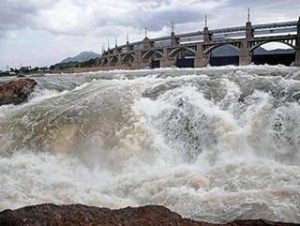
National Green Tribunal has allowed the Tamil Nadu government to proceed with the Mettur-Sarabanga lift irrigation project and has dismissed an application seeking a stay on the project.
- The application claimed that prior environmental clearance was not obtained before work for the project commenced.
- It also alleged irregularity in the construction of the project and said the project was envisaged in total disregard of the riparian rights of the delta farmers.
- Also, since the project involved the interests of Tamil Nadu, Karnataka, and Kerala, clearance from the Central government was required.
- The proposed irrigation area under the project was 4,238 acres of land, which was less than 2,000 hectares and as per the amended 2018 EIA Notification, the project fell under the category of minor irrigation systems that are expressly exempted from the requirement of environmental clearance.
- Besides, the water received from Karnataka was only being regulated and that water from the Mettur dam was not being shared by any two States and was being utilized only for the benefit of Tamil Nadu. Hence, there was no necessity for obtaining permission from any other authorities.
B R Ambedkar: 130th Birth Anniversary:
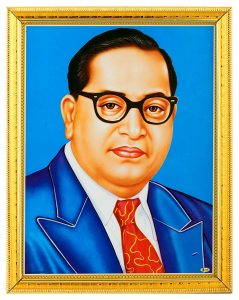
The nation celebrated the 130th birth anniversary of B R Ambedkar on 14th April 2021.
- Dr. Ambedkar was a social reformer, jurist, economist, author, polyglot (knowing or using several languages) orator, a scholar and thinker of comparative religions.
- Birth: Babasaheb Dr. Bhimrao Ambedkar was born in 1891 in Mhow, Central Province (now Madhya Pradesh).
- He is known as the Father of the Indian Constitution and was India’s first Law Minister.
- He was the Chairman of the Drafting Committee for the new Constitution.
- He was a well-known statesman who fought for the rights of the Dalits and other socially backward classes.
- He led the Mahad Satyagraha in March 1927 against Hindus who were opposing the decision of the Municipal Board.
- In 1926, Municipal Board of Mahad (Maharashtra) passed an order to throw open the tank to all communities. Earlier, the untouchables were not allowed to use water from the Mahad tank.
- He participated in all three Round Table Conferences.
- In 1932, Dr. Ambedkar signed the Poona pact with Mahatma Gandhi, which abandoned the idea of separate electorates for the depressed classes (Communal Award).
- However, the seats reserved for the depressed classes were increased from 71 to 147 in provincial legislatures and to 18% of the total in the Central Legislature.
- His ideas before the Hilton Young Commission served as the foundation of the Reserve Bank of India (RBI).
- In 1936, he was elected to the Bombay Legislative Assembly as a legislator (MLA).
- He was appointed to the Executive Council of Viceroy as a Labour member in 1942.
- In 1947, Dr. Ambedkar accepted PM Nehru’s invitation to become Minister of Law in the first Cabinet of independent India.
- He resigned from the cabinet in 1951, over differences on the Hindu Code Bill.
- He converted to Buddhism. He passed away on 6th December 1956 (Mahaparinirvan Diwas).
- Chaitya Bhoomi is a memorial to B R Ambedkar, located in Mumbai.
- He was awarded India’s highest civilian honour the Bharat Ratna in 1990.
Child Labour And Forced Labour In India:
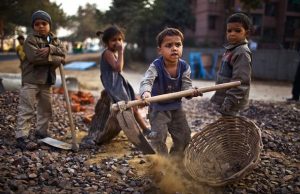
A recent study has raised the issue of ambiguity about definitions of child labour and forced labour in India, especially for sugarcane producing states of Bihar, Karnataka, Maharashtra, Punjab, and Uttar Pradesh.
- The study was commissioned by the United Nations Development Programme (UNDP) and The Coca-Cola Company.
Findings from the Study:
- Authorities discounted underage child labour as “children helping parents in the field”.
- Similarly, confusion was about the advance payment to migrant workers, and associated risks of forced or bonded labour.
- Most of the interventions in the sugarcane sector, either by government authorities or by the Corporate Social
- The responsibility (CSR) arm of companies, were focused just on “improving farming techniques to ensure an increase in cane productivity”.
Child Labour and Forced Labour :
- The term “child labour” is often defined as work that deprives children of their childhood, their potential and their dignity, and that is harmful to physical and mental development.
- Forced labour is defined as “all work or service which is exacted from any person under the menace of any penalty and for which the said person has not offered himself voluntarily”.
S-400 Missile System::
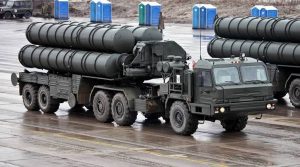
Russian Ambassador to India Nikolai Kudashev recently confirmed that both India and Russia are “committed” to completing their contract for the S-400 missile system, due to be delivered to India at the end of the year. He said both countries opposed U.S. sanctions on the issue.
- The S-400 deal could attract sanctions under the US’ CAATSA law. The US has already sanctioned China and Turkey over similar purchases.
- The S-400 Triumf is a mobile, surface-to-air missile system (SAM) designed by Russia.
- It is the most dangerous operationally deployed modern long-range SAM (MLR SAM) in the world, considered much ahead of the US-developed Terminal High Altitude Area Defense system (THAAD).
- Countering America’s Adversaries through Sanctions Act (CAATSA)‘s core objective is to counter Iran, Russia and North Korea through punitive measures.
- Enacted in 2017.
- Includes sanctions against countries that engage in significant transactions with Russia’s defense and intelligence sectors
The Pterosaur Species:

Researchers have described a pterosaur species with opposable thumbs, which could likely be the earliest-known instance of the limb.
- The pterosaur species were reptiles, close cousins of dinosaurs and the first animals after insects to evolve powered flight. They evolved into various species; while some were as large as an F-16 fighter jet, others were as small as paper airplanes.
- The new pterosaur fossil was discovered in the Tiaojishan Formation of Liaoning, China, and is thought to be 160 million years old. It has been named Kunpengopterus antipollicatus, also dubbed “Monkeydactyl”.
- “Antipollicatus” in ancient Greek means “opposite thumbs”, and it was attached to the name because the researchers’ findings could be the first discovery of a pterosaur with an opposed thumb.
- By studying its forelimb morphology and musculature, they suggest that K. antipollicatus could have used its hand for grasping, which is likely an adaptation for arboreal life.
Germany’s far-right group (Gruppe S):

The trial of 11 individuals who are believed to be members of Germany’s far-right group called “Gruppe S” (Group S) began in the city of Stuttgart. These 11 members are suspected of planning attacks on mosques, asylum centres and the German parliament.
- According to the German government, the organisation was founded by Werner S, Tony E, Michael B, Frank H, Thomas N, Marcel W, Wolfgang W and Paul-Ludwig U during a meeting in September 2019. This meeting and the merger took place at the instigation of Werner S.
- The aim of the founding members was to “shake the state and social order” of Germany by means of a civil war. This would involve attacks on mosques and killing or injuring a large number of Muslims present in the mosque.
- The group also planned to attack political dissenters.
- Support for right-wing parties is on the rise in Europe, which in recent years has seen a surge in popularity of outfits such as the Alternative for Germany (AfD) party in Germany and Vox in Spain that has brought the ideas of national identity and immigration to the forefront.
- The Swedish parliament’s third-largest party, the right-wing Sweden Democrats that has roots in Neo-Nazism, has created the perception among people in recent years that the influx of predominantly Muslim immigrants has led to a surge in crime.
India’s Public Debt:

As per Moody’s Investors Service, India’s public debt level is among the highest in emerging economies with a quantitative easing programme underway, while its debt affordability is among the weakest.
- Public debt is the total amount borrowed by the government of a country.
- In the Indian context, public debt includes the total liabilities of the Union government that have to be paid from the Consolidated Fund of India. It excludes liabilities contracted against Public Account.
- Sources of Public Debt:
- Dated government securities or G-secs
- Treasury Bills or T-bills
- External Assistance
- Short term borrowings
- Public Debt definition by Union Government
- The Union government describes those of its liabilities as public debt, which is contracted against the Consolidated Fund of India. This is as per Article 292 of the Constitution.
- Internal debt is categorized into marketable and non-marketable securities.
- Marketable government securities include G-secs and T-Bills issued through auction.
- Non-marketable securities include intermediate treasury bills issued to state governments, special securities issued to the national Small Savings Fund among others.
Online Grievance Management Portal Of National Commission For Scheduled Castes (NCSC):
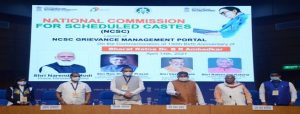
The government of India launched the “Online Grievance Management Portal of National Commission for Scheduled Castes (NCSC)”
- This NCSC Grievance Management portal would make it easier for Scheduled Castes population to register their complaint from any part of the country.
- The portal is designed in collaboration with the Bhaskaracharya Institute for Space Applications and Geoinformatics (BISAG-N), a Centre of Excellence under the Ministry of Electronics and Information Technology.
- The National Commission for Scheduled Castes (NCSC) was set up under Article 338 of the Constitution of India with the objective to investigate and monitor all issues pertaining to the safeguards provided for the Scheduled Castes under any law for the time being in force or under any order of the Government of India.
Hydrogen Roundtable Titled “Hydrogen Economy- The Indian Dialogue-2021:
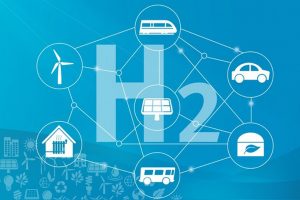
The Energy Forum (TEF) and the Federation of Indian Petroleum Industry (FIPI), under the aegis of the Ministry of Petroleum and Natural Gas, Government of India, are organizing a Hydrogen Roundtable titled “Hydrogen Economy- the Indian Dialogue-2021” in a virtual mode on 15th April 2021.
- The Hydrogen Roundtable, the first of its kind, will comprise a High-level Ministerial Session, followed by five Panel Discussions by eminent policy makers, experts, and industry leaders from different geographical regions of the world, with a focus on policy roadmaps and mapping demand and supply of Hydrogen.
- This high-level roundtable conference will be led by Shri Dharmendra Pradhan, Minister for Petroleum and Natural Gas & Steel, Government of India.
- A separate session is devoted to India’s Hydrogen Mission.
- The Hydrogen Roundtable will be having 25 panelists from15 countries, discussing the potential of Hydrogen from multiple sources and its relevance in national energy transitions.
- The objective of the Roundtable is to understand the progress of the Hydrogen ecosystem across continents and contribute to creating synchrony among the think tanks, Governments, and the industry to join forces for developing innovative and sustainable technologies at attractive costs.




